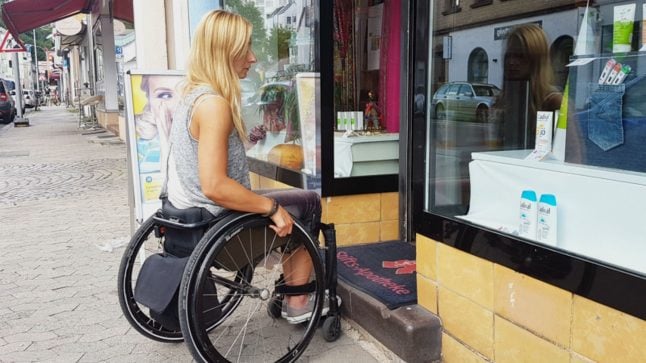Disability advocates consider the ruling a victory which positions them well to champion better access at other service providers, particularly in the medical industry, said the Bundesverband Selbsthilfe Körperbehinderter (Association for the self-assistance of people with physical disabilities, or BSK) in a statement.
The case came about when a pharmacy owner – complaining about current operating regulations – said that a five centimetre barrier between the pavement and the entrance was enough for a person with a physical disability to cross. Yet the court struck down his argument on Tuesday.
“In its ruling, the Administrative Court clarified that “barrier-free” [as its referred in current regulations] basically requires that steps, thresholds and other obstacles be removed so that people with a wheelchair can enter without assistance,” Dunja Fuhrmann, of the BSK in Saarland, told The Local.
“A step – no matter what the difference in height – can be an obstacle for many people dependent on a wheelchair, but also for people with other physical disabilities, which cannot be overcome without help,” said the BSK in a statement.
READ ALSO: At last: Germany passes major disabled rights reform
Previously “well-intentioned suggestions” such as a mobile ramp in combination with a radio bell at the entrance, or the assistance of the staff, are not enough, they added.
The BSK is also advocating for improvement in other infrastructural issues, such as better access on long distance buses and in tourist attractions, in addition to daily services including post offices.

Post offices are another daily service which can pose barriers for people with physical disabilities in Germany. Photo: Peter Reichert, BSK
The German parliament (Bundestag) in 2016 passed comprehensive reform legislation to expand rights for the 7.6 million people who live with severe disabilities in Germany.
Most of them (61 percent) had physical disabilities, such as internal organ problems (25 percent), reduced arm or leg functioning (13 percent), back problems (12 percent), or visual impairment such as blindness (5 percent).
What do you think that Germany can do to improve its access for people with physical disabilities? Let us know in the comments or email us.



 Please whitelist us to continue reading.
Please whitelist us to continue reading.
Member comments